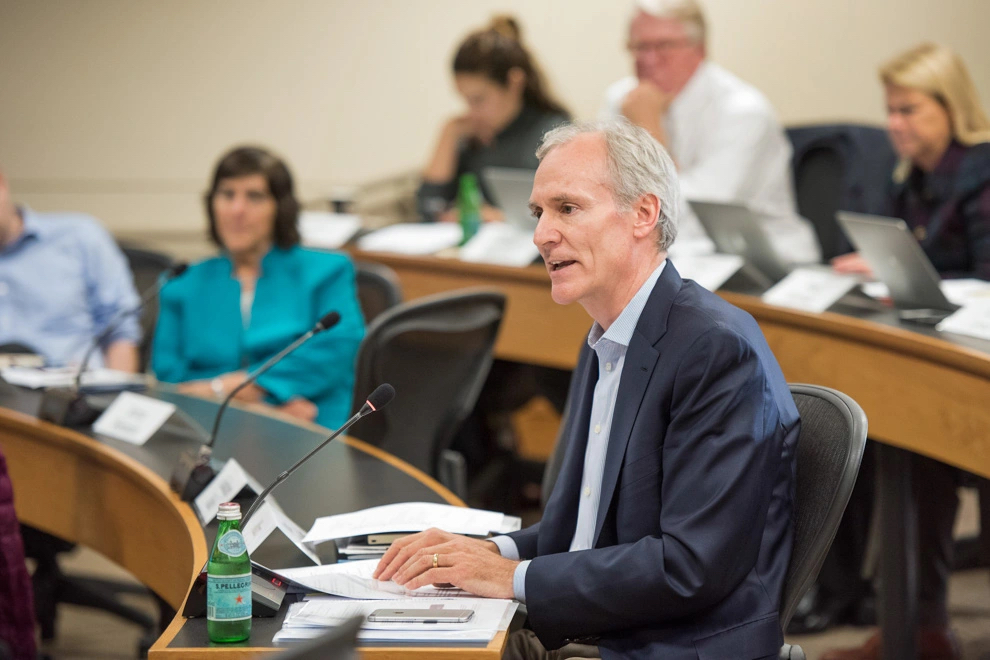Members of the Faculty Senate expressed concerns about the University’s Protected Identity Harm Reporting (PIHR) system and heard updates about the University’s legal proceedings regarding a property tax issue at the Senate’s meeting on Thursday. The meeting was the final one of winter quarter and adjourned early for a closed executive session pertaining to undergraduate admissions.
After a memorial resolution was passed for Makoto Ueda, a professor emeritus who studied Japanese poetry, President Marc Tessier-Lavigne updated the Senate about legal proceedings regarding a property tax issue affecting homes on campus. According to Tessier-Lavigne, county assessors have increased the assessed value of some newly purchased properties for faculty to “well above the faculty purchase price.” He added that this change in assessed value created “unexpected and substantial” financial difficulty for some faculty.
“At the root of this is an unresolved legal question about how the University’s retained interest, the minority interest, in campus property should be treated. We respect the assessor’s viewpoint and his legal rights to reconsider the long established practice of assessing on campus homes based on the purchase price,” Tessier-Lavigne said. “But we also firmly believe that the established practice is fully supported by the law. Because there are differing legal interpretations, held in good faith, the university is now seeking clarity from the Court after having exhausted all remedies at the administrative level.”
Although no members of the senate asked Tessier-Lavigne about the property value assessments, one attendee asked about the administration’s stance on the discontinuation of the Shopping Express and N and O Marguerite Lines, which graduate students have argued are essential for transportation to nearby grocery stores.
Provost Persis Drell confirmed that the return of the Shopping Express “is being considered,” but in a limited capacity, not for a full return. “It is based on our usage statistics and what we feel supports the community,” Drell said.
Toward the end of the allotted period for asking questions to the president and provost, Michael Boskin, an economics professor and Senior Fellow at the Hoover Institution, expressed his “confidence” in President Tessier-Lavigne’s leadership amidst coverage published in The Daily about allegations of research misconduct involving Tessier-Lavigne.
“I, for one, appreciate the way the president has handled the situation,” Boskin said. “And I have full confidence that he will continue to handle it that way and ably lead Stanford while we wait for this matter to be finalized with the trustees’ report.”
Tessier-Lavigne is currently under investigation by the Stanford Board of Trustees for alleged research misconduct following allegations first reported in The Daily that multiple papers co-authored by the president contain altered images.
Protected Identity Harm Reporting
Provost Persis Drell provided information to “clarify the process” of the University’s Protected Identity Harm Reporting (PIHR) system, a process that the University uses to address harms to individuals who perceived differential treatment based on race, gender, disability, sexual identity or other protected characteristics.
PIHR has been the subject of scrutiny by some faculty members, who argue that the process could curtail freedom of speech and expression on campus. More than 75 faculty members have signed a petition pertaining to these concerns in light of the reporting system.
According to Drell, Stanford’s bias incident response process originated from its Acts of Intolerance protocol, which was updated in 2021 under the new title of PIHR, alongside a dashboard to promote transparency about issues that could affect the broader community and public safety.
Drell said that PIHR holds the primary purposes of data gathering and transparent reporting of events, adding that PIHR is not designed to be an investigative process. According to Drell, the PIHR website received 70 reports in 2020 and 57 reports in 2022, 17 of which were anonymous. For 19 of the reports in 2022, reporting students were contacted responding to their requests for contact.
“Anonymous or not anonymous, it’s a system where people present accusations on speech, and we think that this chills speech,” said professor of mechanical engineering Juan Santiago.
Drell noted that PIHR is not intended to investigate or punish students who are named in reports. “To be clear, Student Affairs does not contact individual students about issues that might be raised about them through this process,” Drell said.
Drell acknowledged faculty concerns about reports made in the classroom, particularly involving faculty members. Previously, the mechanism that PIHR used to handle student reports against faculty members in the classroom involved referring the report to a “school liaison” who used their “judgment on how to deal with the comments,” Drell said.
Drell noted that, from May 2021 to Jan. 2023, eight reports involving a classroom setting were filed. However, Drell said that the classroom reporting feature would be suspended for now, as it could “potentially bump up against academic freedom.”
“We can model a respectful culture, but we cannot mandate it,” Drell said.
This article has been updated to include additional remarks by Marc Tessier-Lavigne to clarify his statement about property assessments.
